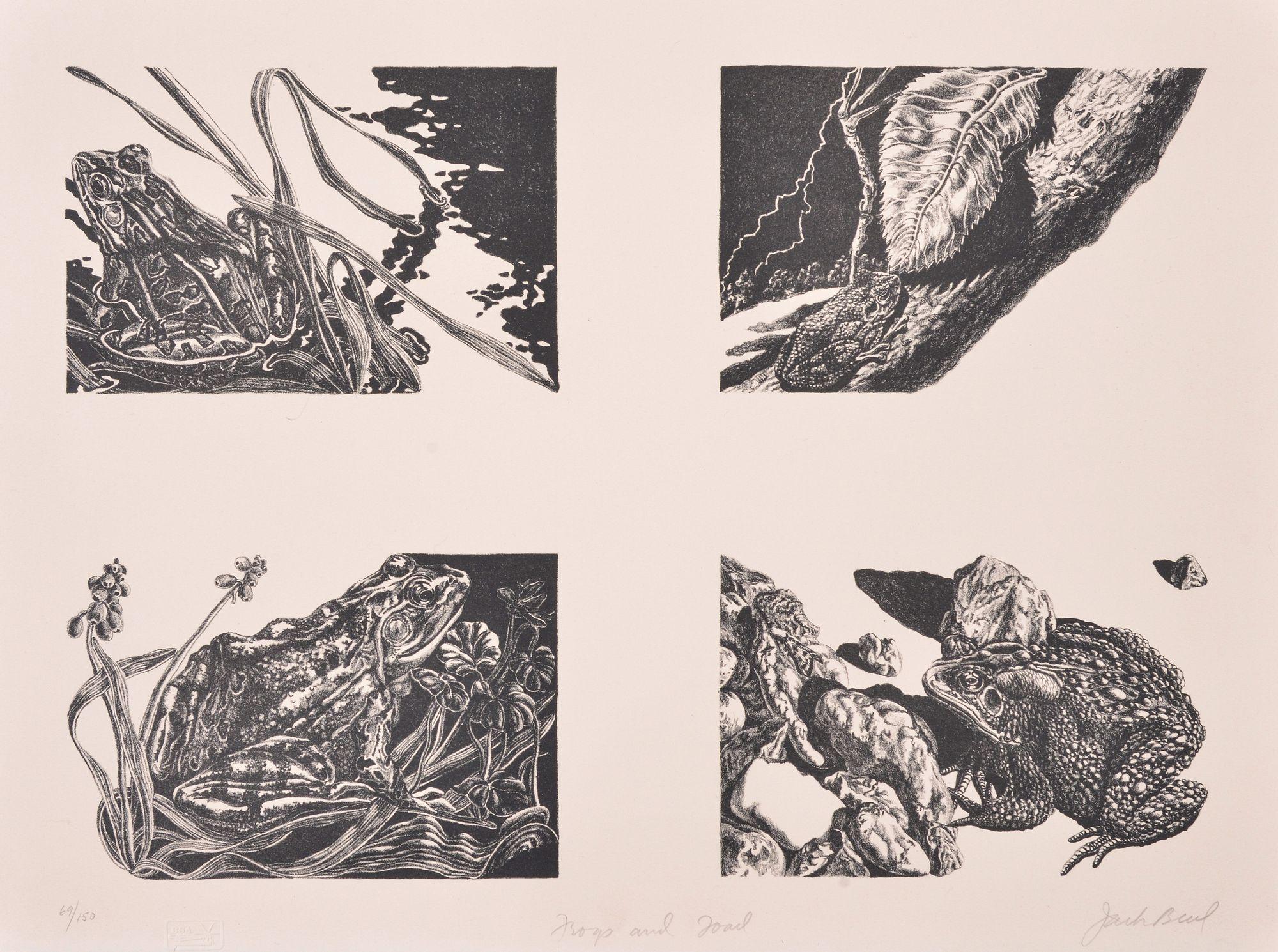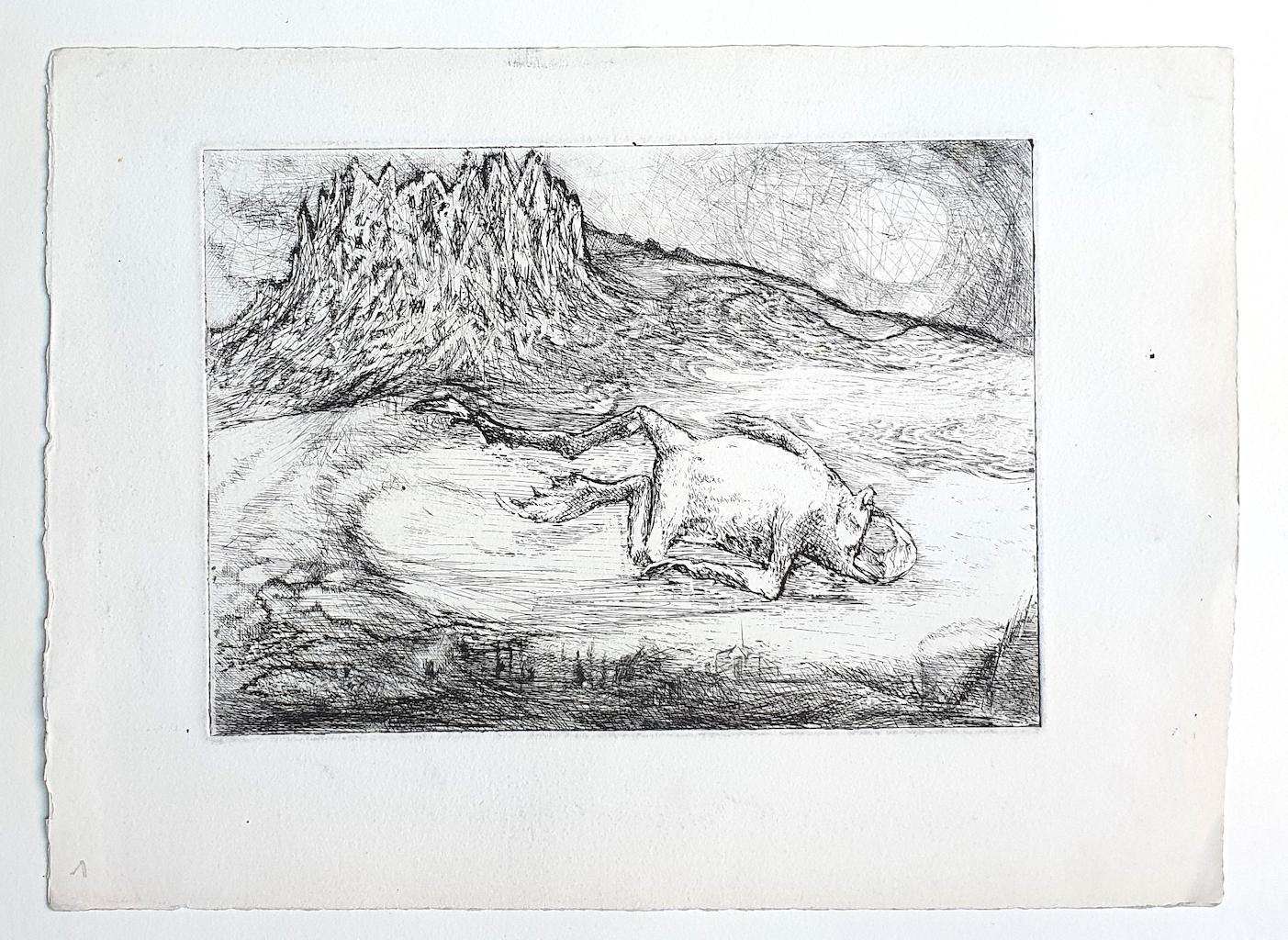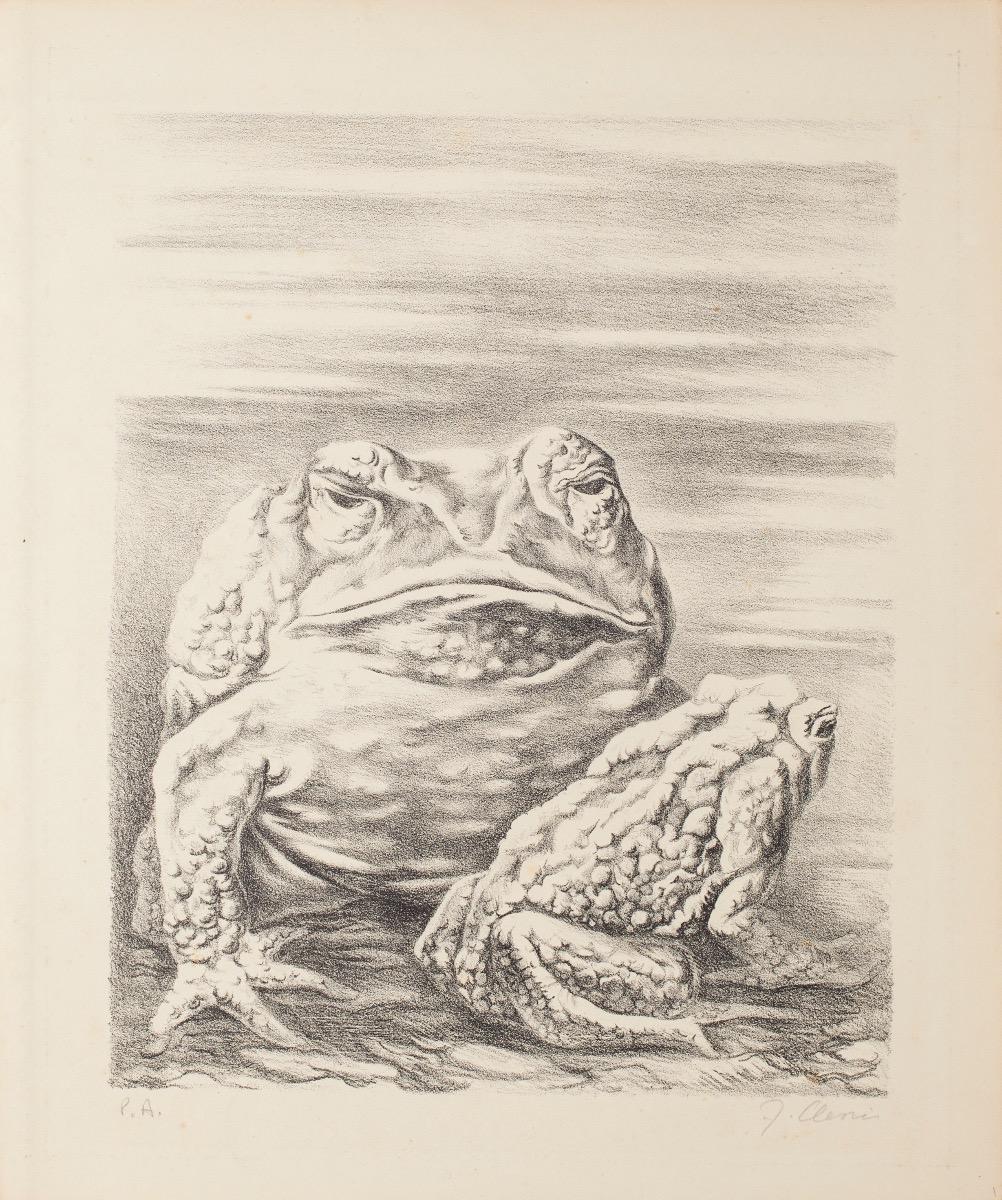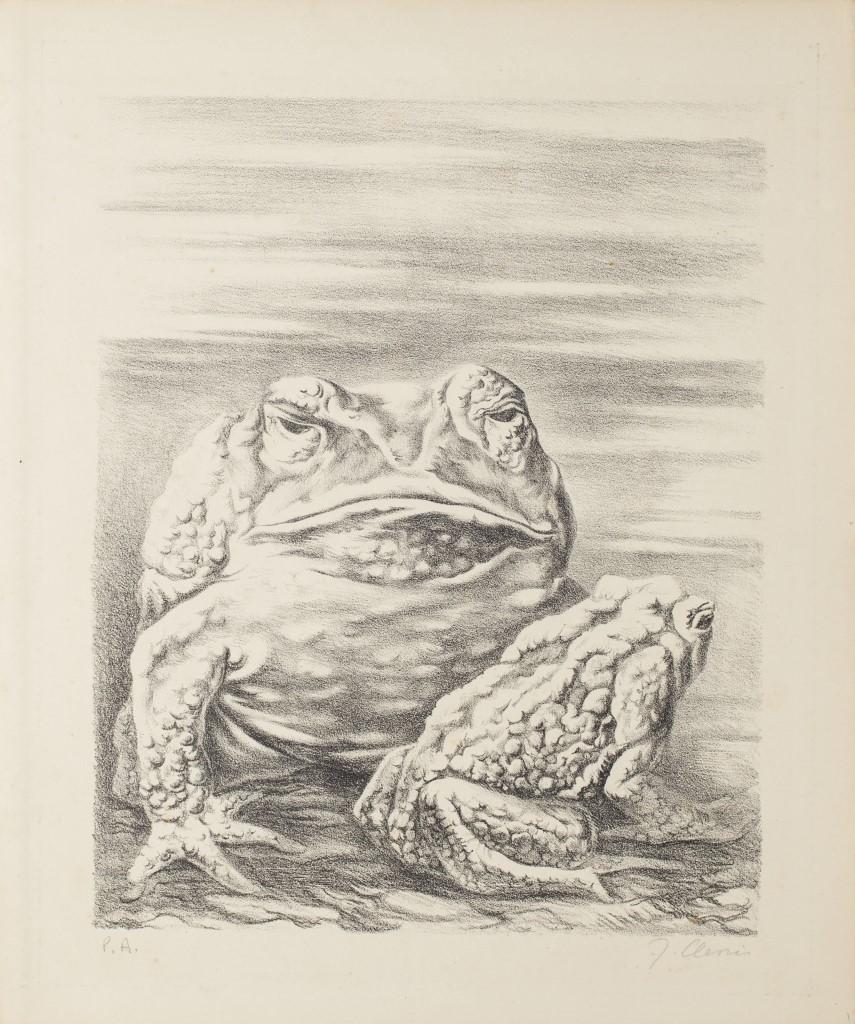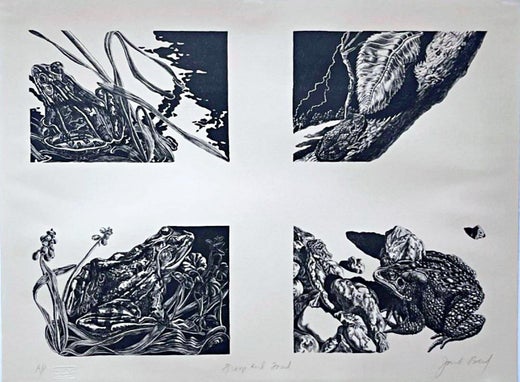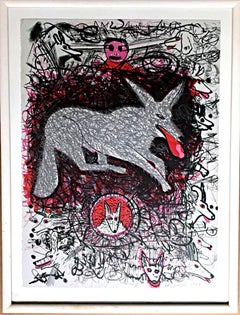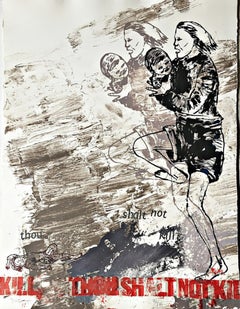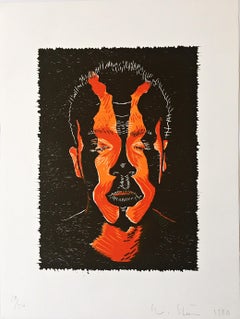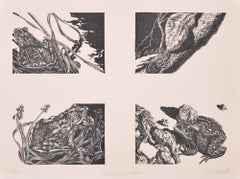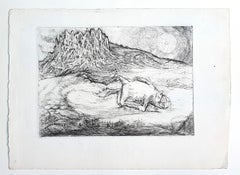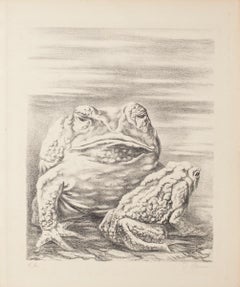Items Similar to Frogs and Toad, Signed lithograph (AP), from Conspiracy: The Artist as Witness
Want more images or videos?
Request additional images or videos from the seller
1 of 8
Jack BealFrogs and Toad, Signed lithograph (AP), from Conspiracy: The Artist as Witness1971
1971
$300
£226.40
€259.20
CA$423.10
A$464.51
CHF 242.34
MX$5,621.22
NOK 3,037.31
SEK 2,861.94
DKK 1,934.83
About the Item
Jack Beal
Frogs and Toad, 1971
Hand signed in pencil by Jack Beal, annotated AP
One-color lithograph proofed by hand and pulled by machine from a zinc plate on Arches buff paper with deckled edges at the Shorewood Bank Street Atelier
Stamped, hand numbered AP, aside from the regular edition of 150 Stamped on reverse: COPYRIGHT © 1971 BY JACK BEAL, bears blind stamp
18 × 24 inches
Unframed
18 x 24 inches
Stamped on reverse: COPYRIGHT © 1971 BY JACK BEAL, bears distinctive blind stamp of publisher (shown) Publisher: David Godine, Center for Constitutional Rights, Washington, D.C.
Jack Beal's "Frogs and Toads" is a classic example of protest art from the early 1970s - the most influential era until today. This historic graphic was created for the legendary portfolio "CONSPIRACY: the Artist as Witness", to raise money for the legal defense of the Chicago 8 - a group of anti-Vietnam War activists indicted by President Nixon's Attorney General John Mitchell for conspiring to riot during the 1968 Democratic National Convention. (1968 was also the year Bobby Kennedy was killed and American casualties in Vietnam exceeded 30,000.) The eight demonstrators included Abbie Hoffman, Jerry Rubin, David Dellinger, Tom Hayden, Rennie Davis, John Froines, Lee Weiner, and Bobby Seale. (The eighth activist, Bobby Seale, was severed from the case and sentenced to four years for contempt after being handcuffed, shackled to a chair and gagged.) Although Abbie Hoffman would later joke that these radicals couldn't even agree on lunch, the jury convicted them of conspiracy, with one juror proclaiming the demonstrators "should have been shot down by the police." All of the convictions were ultimately overturned by the 7th Circuit Court of Appeals.
This lithograph has fine provenance: it comes directly from the original Portfolio: "Conspiracy The Artist as Witness" which also featured works by Alexander Calder, Nancy Spero and Leon Golub, Romare Bearden Sol Lewitt, Robert Morris, Claes Oldenburg, Larry Poons, Peter Saul, Raphael Soyer and Frank Stella - as well as this one by Jack Beal. It was originally housed in an elegant cloth case, accompanied by a colophon page. This is the first time since 1971 that this important work has been removed from the original portfolio case for sale. It is becoming increasingly scarce because so many from this edition are in the permanent collections of major museums and institutions worldwide.
Jack Beal wrote a special message about this work on the Portfolio's colophon page. It says, "In 1956, shortly after Sondra and I moved to New York, two friends were arrested and jailed for protesting air-raid drills. From them and their friends came our education. This work is dedicated to them and their families. "In Memory of Patricia McClure Daw and AL Uhrie" - This print was made for their children.
Jack Beal Biography:
Early in his career Walter Henry “Jack” Beal Jr. painted abstract expressionist canvases, because he believed it was “the only valid way to paint.” By the early 1960s he totally altered his approach and fully repudiated abstraction. Turning to representation, he painted narrative and figurative subjects, often enhanced by bright colors and dramatic perspectives.
Beal was born in Richmond, Virginia, and from 1950 to 1953 he attended the Norfolk Division of William and Mary College Polytechnic Institute, (now Old Dominion University) where he studied biology and anatomy. Shifting gears, he sought art training at the School of the Art Institute of Chicago where he focused on drawing, and met his wife, artist Sondra Freckelton. His art history instructor encouraged her students to paint in the manner of established artists, and to that end he frequented the Institute’s galleries. For Beal this was significant: “Until I saw pictures of real quality I had tended to think of painting as just so much self-indulgent smearing around, but when I saw masterpieces by Cézanne and Matisse, and other painters of similar stature, I was bowled over; suddenly I realized the force of art.”
After spending three years (1953–1956) at the Art Institute, Beal concluded his studies there without getting a terminal degree, thinking it was only useful if he wanted to teach, which, at the time, he did not. He also took courses at the University of Chicago in 1955 and 1956. During this period he married Freckelton, a fellow student and sculptor who began her career working in wood and plastic. Together they moved to New York’s SoHo District before its transformation from a wasteland of sweatshops and small factories into an arts district. They were active with the Artist Tenants Association which was instrumental in getting zoning laws changed so that artists could live and work in the well-lit lofts.
Embracing what came to be called “New Realism,” Beal initially painted an occasional landscape as well as earthy-toned still lifes which consisted of jumbled collections filled with personal objects. His signature style started with a series of female nudes—all modeled by Freckelton—based on Greek mythology. These were large canvases with flat paint surfaces, dramatic foreshortening, and unusual perspectives. He further enlivened them with vivid colors, stark lighting, and dynamic patterns derived from textiles and overstuffed furniture. He stopped painting nudes after two episodes. The first came as he was loading a canvas of his naked wife onto a truck in lower Manhattan; several laborers walked by and started to fondle and kiss the painting. On the one hand he felt his wife had been violated, while on the other he was pleased that his realism was so convincing. The second occurred after a solo exhibition in Chicago at which the reception had been sponsored by Playboy magazine. A few days later he was approached by a publicist and asked if Playboy bunnies could be photographed in front of his paintings. He refused.
Some portrait commissions came Beal’s way, but he preferred only portraying friends. More significant were four large murals on the History of Labor in America, the 20th Century: Technology (1975), which he undertook for the headquarters of the United States Department of Labor in Washington. Following a historical timeline, the themes were: colonization, settlement, nineteenth century industry, and twentieth century technology. The unveiling ceremony was attended by government officials and Joan Mondale, an arts advocate and wife of the vice-president. The reviewer for the Washington Post wrote enthusiastically: “They’re heartfelt and they’re big (each is 12 feet square). Their many costumed actors (the Indian, the trapper, the scientist, the hardhat, the capitalist in striped pants, the union maid, etc.) strike dramatic poses in dramatic settings (a seaside wood at dawn, an outdoor blacksmith’s forge, a 19th-century mill, a 20th-century lab). The lighting is theatrical. Beal’s compositions, with their swooping curves and bunched diagonals, are as complicated as his interwoven plots.” To accomplish the murals Beal assembled a team of assistants and models, much in the manner of Renaissance masters, which included artist friends and Freckelton. who by then was painting brightly colorful still lifes.
A second mural commission ensued from New York City’s Metropolitan Transit Authority for two twenty-foot long installations for the Times Square Interborough Rapid Transit Company subway station. Beal’s designs for The Return of Spring (installed in 2001, three days after the terrorist attacks in New York, Washington, DC and Philadelphia) and The Onset of Winter (installed in 2005), Beal captured the appearance of his models in an oil painting made to the scale of the intended mosaic. A collaboration with Miotto Mosaics, the canvases were shipped to the Travisanutto Workshop, in Spilimbergo, Italy, where craftsmen fabricated the design to glass mosaics. The Return of Spring depicted construction workers and other New Yorkers in front of a subway kiosk and an outdoor produce market and in The Onset of Winter, a crowd watches a film crew recording a woman entering the subway as snow falls against the city’s skyline. Harkening back to some of his early nudes based on Greek myth, Persephone, goddess of fertility and wife of Hades, appears in both. The symbolism is pertinent, since she spent six months each year below ground.
Although he disparaged teaching early on, Beal and Freckelton offered four summertime workshops on their farm in Oneonta, New York. He was an instructor at the New York Academy of Art, a graduate art school he helped to establish in 1982. Returning to Virginia, he taught at Hollins College, which in 1994 awarded him an honorary degree. A previous honorary degree was issued in 1992 from the Art Institute of Boston. In 1990 he was the Gian Carlo Menotti artist-in-residence at the Spoleto USA Festival in Charleston. He was also the founder of the Artists’ Choice Museum in New York, the recipient of numerous grants and awards, and a visiting lecturer at over 100 schools, universities and museums throughout the country.
- Creator:Jack Beal (1931 - 2013, American)
- Creation Year:1971
- Dimensions:Height: 18 in (45.72 cm)Width: 24 in (60.96 cm)
- Medium:
- Movement & Style:
- Period:
- Condition:Excellent original condition. Unframed.
- Gallery Location:New York, NY
- Reference Number:1stDibs: LU1745216243272
Jack Beal
Walter Henry "Jack" Beal Jr. was an American realist painter
About the Seller
5.0
Platinum Seller
Premium sellers with a 4.7+ rating and 24-hour response times
Established in 2007
1stDibs seller since 2022
451 sales on 1stDibs
Typical response time: 2 hours
- ShippingRetrieving quote...Shipping from: New York, NY
- Return Policy
Authenticity Guarantee
In the unlikely event there’s an issue with an item’s authenticity, contact us within 1 year for a full refund. DetailsMoney-Back Guarantee
If your item is not as described, is damaged in transit, or does not arrive, contact us within 7 days for a full refund. Details24-Hour Cancellation
You have a 24-hour grace period in which to reconsider your purchase, with no questions asked.Vetted Professional Sellers
Our world-class sellers must adhere to strict standards for service and quality, maintaining the integrity of our listings.Price-Match Guarantee
If you find that a seller listed the same item for a lower price elsewhere, we’ll match it.Trusted Global Delivery
Our best-in-class carrier network provides specialized shipping options worldwide, including custom delivery.More From This Seller
View AllRoy De Forest, Dog lithograph, signed/n by world renowned California pet painter
By Roy De Forest
Located in New York, NY
Roy De Forest
Untitled (Dog), 1981
Color lithograph with deckled edges. Floated and framed.
Pencil signed and numbered from the edition of 125
Frame Included: held in original vintage white frame
Wonderful whimsical rare 1981 lithograph by the incredibly popular and beloved Roy de Forest, famous for his paintings and prints of dogs...
Category
1980s Surrealist Animal Prints
Materials
Lithograph
Untitled Signed lithograph on Arches paper by world famous dog artist, unique TP
By Roy De Forest
Located in New York, NY
ROY DE FOREST
Untitled, 1981
Lithograph on Arches paper with four deckled edges.
22 1/2 × 30 inches
Hand signed and annotated Trial Proof, aside from the regular edition of 60
Unfra...
Category
1980s Contemporary Animal Prints
Materials
Archival Paper, Pencil, Graphite, Lithograph
Nancy Spero, Thou Shalt Not Kill (The Sixth Commandment), signed/n lithograph
By Nancy Spero
Located in New York, NY
Nancy Spero
Thou Shalt Not Kill (The Sixth Commandment), 1987
from the 10 Commandments Portfolio
9 Color lithograph and letterpress on Dieu Donne handmade paper
24 × 18 inches
Edition AP 2/15
Signed and numbered AP 2/15, aside from the regular edition of 84
Printed by Peter Kruty, Dan Stack and Judy Solodkin
Unframed with deckled edges
This nine color lithograph and letterpress on Dieu Donne handmade paper is a signed, dated and numbered Artist's Proof, numbered AP 2/15, aside from the regular edition of 84. It was created as part of the 1987 portfolio "The Ten Commandments", in which ten top Jewish American artists were each invited to choose an Old Testament commandment to interpret in contemporary lithographic form. The "Chosen" artists were, in order of Commandment: Kenny Scharf, Joseph Nechvatal, Gretchen Bender...
Category
1980s Realist Abstract Prints
Materials
Lithograph
Scarce lithograph, from the Art Against AIDS Portfolio, signed/numbered 38/50
Located in New York, NY
William Steen
Untitled, from the Art Against AIDS Portfolio, 1988
Lithograph on paper with deckled edges
Hand signed, numbered 38/50 and dated on lower front with printer's and publisher's blindstamp.
20 1/5 × 15 inches
Unframed
Hand signed, numbered and dated on lower front with printer's and publisher's blindstamp.
This powerful limited edition lithograph by William Steen was published in 1988 as part of the Art Against Aids portfolio, numbered 38/50.
Superb provenance as it is was acquired from the original Art Against AIDS Portfolio published in Houston, Texas. This will be the first time the work will be removed from the portfolio. The late 1980s was the height of the AIDS epidemic, and this was one of many efforts by the creative community to raise funds to assist in fighting this deadly scourge that disproportionately affected the artistic community.
William Steen 1949-2008
William Steen, artist, collector, curator, and mystic, died of pancreatic cancer on December 20 in New York, where he has lived since 2001. Long time framer at the Menil Collection, the soft-spoken Steen is remembered in Houston where he had his first exhibition of paintings in 1978 at the Roberto Molina Gallery. In 1984 Steen made his first of several trips to India, photographing thousands of Tibetan Buddhist ritual paintings. A champion of outsider art, in 2000 he tangled with the Houston Police over the grafitti mural he comissioned for the walls of the reclaimed Sterling Cleaners...
Category
1980s Contemporary Portrait Prints
Materials
Lithograph
Thou Shalt Not Covet Thy Neighbors Goods (The Tenth Commandment) Signed/N print
By Richard Bosman
Located in New York, NY
Richard Bosman
Thou Shalt Not Covet Thy Neighbors Goods (The Tenth Commandment), 1987
2 Color Lithograph with hand coloring on Dieu Donne handmade paper
24 × 18 inches
Signed and numbered 6/84; with unique hand-coloring
Unframed
Created as part of the 1987 portfolio "The Ten Commandments", in which ten top Jewish American artists were each invited to choose an Old Testament commandment to interpret in contemporary lithographic form. The "Chosen" artists were, in order of Commandment: Kenny Scharf, Joseph Nechvatal, Gretchen Bender...
Category
1980s Contemporary Figurative Prints
Materials
Acrylic, Lithograph
Untitled, from the Long Point Gallery Portfolio
Located in New York, NY
Nora Speyer
Untitled, from the Long Point Gallery Portfolio, 1988
Lithograph on paper with deckled edges
Hand signed, numbered 22/30 and dated on lower front
22 × 15 inches
Unframed
Hand signed, numbered 22/30 and dated on lower front
Publisher: Long Point Gallery, Inc., Provincetown, Massachusetts; Printer: Bruce Porter from Trestle Editions Limited, New York
Rarely to market, this stunning 1988 woodcut was created by Nora Speyer as part of a portfolio produced for sale by Long Point Gallery, an artist's cooperative in Provincetown, Massachusetts.
Superb provenance as it is was acquired from the original Long Point Portfolio. This will be the first time the work will be removed from the portfolio.
It is hand signed and numbered from a very small edition of only 30; it is in fine condition, unframed and never framed, and housed in the original portfolio box, with the original colophon page, which also included works by 11 other artists.
For reference and provenance we have included an image of the colophon page from the complete portfolio.
About Nora Speyer:
The most exciting place to me is where I can communicate with the greatest number of artists. I can't live without some artists around. I'm not saying artists are likable. They can be very objectionable, but they are still my world.
Nora Speyer
Born in Pittsburgh, Speyer enrolled at Temple University's Tyler School of Art when she was sixteen. It was there she became roommates with Lillian Lent...
Category
1980s Abstract Abstract Prints
Materials
Pencil, Lithograph
You May Also Like
Frogs and Toads, Realist Black and White Lithograph by Jack Beal
By Jack Beal
Located in Long Island City, NY
Artist: Jack Beal, American (1931 - 2013)
Title: Frogs and Toads - Conspiracy: The Artist as Witness
Year: 1971
Medium: Lithograph, signed and numbered i...
Category
1970s Realist Figurative Prints
Materials
Lithograph
Jack Beal CONSPIRACY Portfolio Screenprint
By Jack Beal
Located in Lake Worth Beach, FL
Artist/Designer; Manufacturer: Jack Beal (American, 1931-2013)
Marking(s); notes: signed, blind stamp, marking(s); ed. 69/150; 1971
Materials: lithograph on Arches buff
Dimensions (H...
Category
1970s Contemporary Animal Prints
Materials
Lithograph
Frog - l Etching by Marcel Guillard - 20th century
Located in Roma, IT
Frog is an original etching artwork, realized by Marcel Guillard (1896 -?).
The state of preservation is very good.
The artwork represents a lying down frog on the front and mounta...
Category
20th Century Modern Figurative Prints
Materials
Paper, Etching
The Frogs - Original Lithograph by Fabrizio Clerici - 1940 ca
By Fabrizio Clerici
Located in Roma, IT
The Frogs is an enchanting lithograph realized in 1940 ca. by Fabrizio Clerici (1913-1993).
Hand-signed in pencil, on the lower right. Artist's proof "P.A", on the lower left.
The ...
Category
1940s Modern Animal Prints
Materials
Lithograph
The Frogs - Lithograph by Fabrizio Clerici - 20th Century
By Fabrizio Clerici
Located in Roma, IT
The Frogs is an enchanting lithograph realized by Fabrizio Clerici (1913-1993).
Hand-signed, written in pencil, on the lower right. Acronyms "P.A", on the lower left.
Image Dimensi...
Category
20th Century Modern Animal Prints
Materials
Lithograph
Oppian : Snake and Toad - Original Etching
By Pierre-Yves Trémois
Located in Paris, IDF
Pierre-Yves TREMOIS
Oppian : Snake and Toad, 1955
Original etching
Printed signature in the plate
On vellum 76 x 56 cm (c.30 x 22 inch)
Excellent condition
Category
1950s Modern Animal Prints
Materials
Etching
More Ways To Browse
Vintage Bee
Vintage Swoop
19th Century Reverse Painting On Glass
Fertility Goddess
Vintage Striped Pants
Vintage Kiosk
Spoleto Festival
Frog And Toad
Ken Price Cup
Long Billed Curlew
Mark Sabin
Pablo Picasso Dove
Picasso Lithograph Peace
Picasso Pigeons Lithograph
Robert Greenhalf
The Owl Lithograph
Vintage Basset Hound Art
Vintage Slate Pencils
